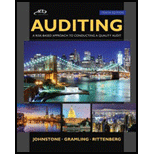
Auditing: A Risk Based-Approach to Conducting a Quality Audit
10th Edition
ISBN: 9781305080577
Author: Karla M Johnstone, Audrey A. Gramling, Larry E. Rittenberg
Publisher: South-Western College Pub
expand_more
expand_more
format_list_bulleted
Question
Chapter 3, Problem 20TFQ
To determine
Introduction: The auditor assesses the reliability of the financial reporting of an organization by conducting the process called auditing. The auditor must check the frauds that happened in accounting and financial reporting and it is the duty of the auditor to report the frauds and errors.
To identify: If the given statement regarding the auditor’s responsibility is true/false.
Expert Solution & Answer
Want to see the full answer?
Check out a sample textbook solution
Students have asked these similar questions
I want the correct answer with accounting question
Pension plan assets were $2,350 million at the beginning of the year and $2,580 million at the end of the year. At the end of the year, retiree benefits paid by the trustee were $61 millionand cash invested in the pension fund was $62 million. What was the percentage rate of return on plan assets?
need help this problem
Chapter 3 Solutions
Auditing: A Risk Based-Approach to Conducting a Quality Audit
Ch. 3 - Prob. 1TFQCh. 3 - Prob. 2TFQCh. 3 - Prob. 3TFQCh. 3 - Prob. 4TFQCh. 3 - Prob. 5TFQCh. 3 - The control environment is seen as the foundation...Ch. 3 - Prob. 7TFQCh. 3 - Prob. 8TFQCh. 3 - Prob. 9TFQCh. 3 - Prob. 10TFQ
Ch. 3 - Prob. 11TFQCh. 3 - Prob. 12TFQCh. 3 - Prob. 13TFQCh. 3 - Prob. 14TFQCh. 3 - Prob. 15TFQCh. 3 - Prob. 16TFQCh. 3 - Prob. 17TFQCh. 3 - Prob. 18TFQCh. 3 - Prob. 19TFQCh. 3 - Prob. 20TFQCh. 3 - Prob. 21MCQCh. 3 - Prob. 22MCQCh. 3 - What are the components of internal control per...Ch. 3 - Prob. 24MCQCh. 3 - Prob. 25MCQCh. 3 - Which one of the following components of internal...Ch. 3 - Prob. 27MCQCh. 3 - Prob. 28MCQCh. 3 - Prob. 29MCQCh. 3 - Prob. 30MCQCh. 3 - Prob. 31MCQCh. 3 - Prob. 32MCQCh. 3 - Prob. 33MCQCh. 3 - Prob. 34MCQCh. 3 - Prob. 35MCQCh. 3 - Prob. 36MCQCh. 3 - Prob. 37MCQCh. 3 - Prob. 38MCQCh. 3 - Prob. 39MCQCh. 3 - Prob. 40MCQCh. 3 - Prob. 41RSCQCh. 3 - Prob. 42RSCQCh. 3 - Prob. 43RSCQCh. 3 - Prob. 44RSCQCh. 3 - Distinguish between entity-wide and transaction...Ch. 3 - Refer to Exhibit 3.2. List the principles...Ch. 3 - Prob. 47RSCQCh. 3 - Prob. 48RSCQCh. 3 - Prob. 49RSCQCh. 3 - Prob. 50RSCQCh. 3 - Refer to Exhibit 3.3. For each risk assessment...Ch. 3 - Prob. 52RSCQCh. 3 - Prob. 53RSCQCh. 3 - Prob. 54RSCQCh. 3 - Prob. 55RSCQCh. 3 - Prob. 56RSCQCh. 3 - Prob. 57RSCQCh. 3 - Prob. 58RSCQCh. 3 - Authorization of transactions is a key control in...Ch. 3 - Prob. 60RSCQCh. 3 - Prob. 61RSCQCh. 3 - Prob. 62RSCQCh. 3 - Prob. 63RSCQCh. 3 - Prob. 64RSCQCh. 3 - Prob. 65RSCQCh. 3 - Prob. 66RSCQCh. 3 - Prob. 67RSCQCh. 3 - Prob. 68RSCQCh. 3 - Refer to Exhibit 3.9. What are the important...Ch. 3 - Refer to Exhibit 3.10 and Exhibit 3.11. Describe...Ch. 3 - Prob. 71RSCQCh. 3 - Prob. 72RSCQCh. 3 - Prob. 73RSCQCh. 3 - Prob. 74RSCQCh. 3 - Assume that management is gathering evidence as...Ch. 3 - Prob. 76RSCQCh. 3 - Prob. 77RSCQCh. 3 - Prob. 78RSCQCh. 3 - Prob. 79FFCh. 3 - Diamond Foods, Inc. (LO 8, 9) In February 2012,...
Knowledge Booster
Similar questions
- I need guidance with this financial accounting problem using the right financial principles.arrow_forwardA company had expenses other than the cost of goods sold of $280,000. Determine sales and gross profit given that the cost of goods sold was $120,000 and net income was $180,000.arrow_forwardaccounting?arrow_forward
- I need assistance with this general accounting question using appropriate principles.arrow_forwardWhat is the total manufacturing cost?arrow_forwardRachel is the stockholder and operator of Grand Dream LLC, a business coaching service. At the end of its accounting period, December 31, 2017, Grand Dream has assets of $825,000 and liabilities of $192,000. Using the accounting equation, determine the following amounts: a. Stockholders' equity as of December 31, 2017. b. Stockholders' equity as of December 31, 2018, assuming that assets increased by $128,000 and liabilities decreased by $42,000 during 2018.arrow_forward
- Please explain the solution to this financial accounting problem with accurate principles.arrow_forwardPluto Manufacturing reported the following: • • Direct labor: $7,500 Direct materials used: $3,000 Manufacturing overhead: $950 Cost of goods manufactured: $22,000 Ending work-in-process inventory: $2,200 What is the beginning work-in-process inventory?arrow_forwardProvide accurate answerarrow_forward
arrow_back_ios
SEE MORE QUESTIONS
arrow_forward_ios
Recommended textbooks for you
 Auditing: A Risk Based-Approach (MindTap Course L...AccountingISBN:9781337619455Author:Karla M Johnstone, Audrey A. Gramling, Larry E. RittenbergPublisher:Cengage Learning
Auditing: A Risk Based-Approach (MindTap Course L...AccountingISBN:9781337619455Author:Karla M Johnstone, Audrey A. Gramling, Larry E. RittenbergPublisher:Cengage Learning Auditing: A Risk Based-Approach to Conducting a Q...AccountingISBN:9781305080577Author:Karla M Johnstone, Audrey A. Gramling, Larry E. RittenbergPublisher:South-Western College Pub
Auditing: A Risk Based-Approach to Conducting a Q...AccountingISBN:9781305080577Author:Karla M Johnstone, Audrey A. Gramling, Larry E. RittenbergPublisher:South-Western College Pub- Business/Professional Ethics Directors/Executives...AccountingISBN:9781337485913Author:BROOKSPublisher:Cengage

Auditing: A Risk Based-Approach (MindTap Course L...
Accounting
ISBN:9781337619455
Author:Karla M Johnstone, Audrey A. Gramling, Larry E. Rittenberg
Publisher:Cengage Learning

Auditing: A Risk Based-Approach to Conducting a Q...
Accounting
ISBN:9781305080577
Author:Karla M Johnstone, Audrey A. Gramling, Larry E. Rittenberg
Publisher:South-Western College Pub


Business/Professional Ethics Directors/Executives...
Accounting
ISBN:9781337485913
Author:BROOKS
Publisher:Cengage